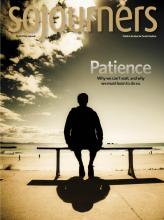IN OCTOBER 2014, at the age of 35, Ingrid Olson stood before her church of many years. “I am loved,” she told the 80 or so members of her congregation seated in the sanctuary on that Sunday evening. “I am God’s child. I am accepted—completely.” Olson listed other parts of her identity: her curiosity, athleticism, passion for music, Swedish heritage, her tendency to be passive-aggressive. “I am a sister, a daughter, a niece, a granddaughter, a friend,” she continued. Then she added something most people in the church didn’t know: “I am a Christian, lesbian woman.”
Olson is a lifelong member of the Evangelical Covenant Church (ECC), a denomination with Swedish-Pietist roots and 850 congregations in North America. Though the central identity of ECC churches is found in six “affirmations,” including the authority of scripture, the importance of missions, and the experience of personal rebirth, the ECC is not what’s known as an “affirming” church—one that encourages LGBTQ members to participate in the full life of the congregation, including marriage, church leadership, and ordination. Delegates at the 2004 ECC annual meeting voted to make binding a resolution that asserts the “biblically rooted” position on human sexuality is “heterosexual marriage, faithfulness within marriage, abstinence outside of marriage.” While the ECC might not say that being gay is a sin, it would certainly say that pursuing a same-sex relationship is out of the question.
Read the Full Article

